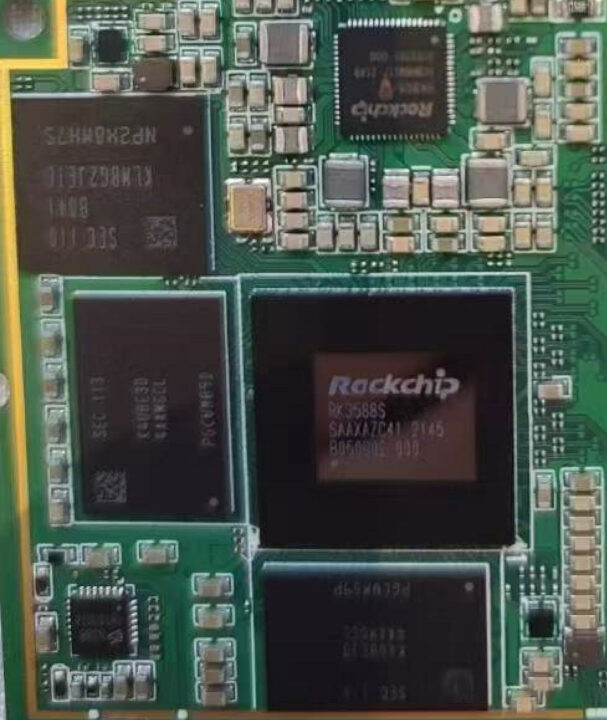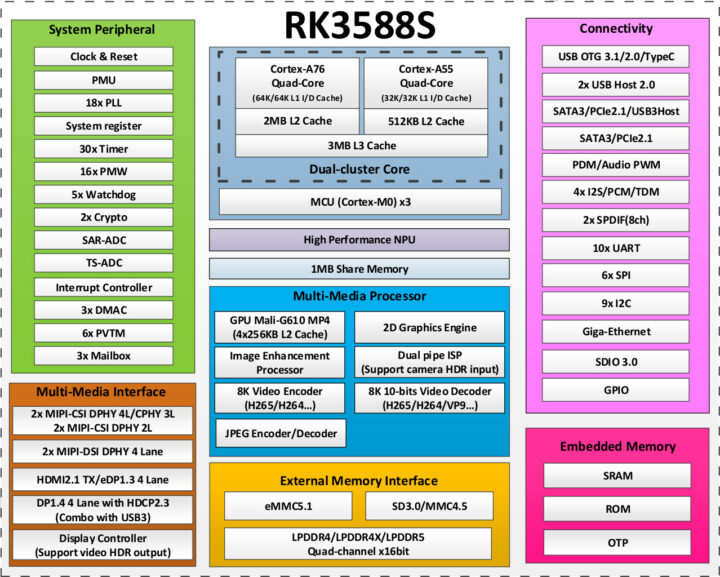Rockchip RK3588S is a cost-optimized version of the RK3588 octa-core Cortex-A76/A55 processor with fewer peripherals, and I’ve been told it’s been designed for tablets, but as we’ll see below, the processor will probably find its way into many other applications.
We first saw RK3588S during the Rockchip Developer Event last December, but at the time we did not have any information, except it would be a lower-cost version. I’ve now received an RK3588S datasheet, so let’s have a look at the block diagram and specifications to find out what’s different.
Rockchip RK3588S specifications with highlights in bold showing the differences against RK3588:
- CPU – 4x Cortex-A76 and 4x Cortex-A55 cores in dynamIQ configuration
- GPU
- Arm Mali-G610 MP4 “Odin” GPU with support for OpenGLES 1.1, 2.0, and 3.2, OpenCL up to 2.2 and Vulkan1.2
- 2D graphics engine up to 8192×8192 source, 4096×4096 destination
- AI Accelerator – 6 TOPS NPU 3.0 (Neural Processing Unit)
- VPU
- Video decoding
- 8Kp60 H.265, VP9, AVS2
- 8Kp30 H.264 AVC/MVC
- 4Kp60 AV1
- 1080p60 MPEG-2/-1, VC-1, VP8
- Real-time 8Kp30 encoding with H.265/H.264; multi-channel encoding supported at lower resolutions
- Video decoding
- Memory I/F – LPDDR4/LPDDR4x/LPDDR5 up to 32GB
- Storage – eMMC 5.1, SD/MMC, 1x SATA 3.0 (multiplexed with PCIe 2.0), FSPI (Flexible SPI)
- Video Output
2x1x HDMI 2.1 / eDP 1.3 up to 8Kp60 (Note: 1x in block diagram, but 2x HDMI/eDP are listed in the datasheet)2x1x DisplayPort 1.4a up to 8Kp30 (multiplexed with USB 3.0)- 2x MIPI DSI output up to 4Kp60
- Bt.1120 video output up to 1080p60
- Not listed in RK3588S datasheet, but I don’t see why not: Optional dual LVDS up to 1080p60 via RK628 chip.
- Up to four independent displays (up to 1x 8Kp60, 2x 4Kp60, 1x 1080p60)
- Video Input/Camera
- 48MP (2x 24MP) ISP with HDR and 3D NR support; multi-camera input
- 2x MIPI DC (4-lane DPHY v2.0 or 3-lane CPHY V1.1)
- 4x 2-lane MIPI CSI
- DVP camera interface
HDMI Rx 2.0 interface up to 4Kp60 with HDCP 2.3 support(Note: removed from the block diagram, but still listed in the datasheet)
- Audio
- 2x 8-channel I2S, 2x 2-channel I2S
- 2x SPDIF
- 2x 8-channel PDM (for mic arrays)
- 2-channel digital audio codec (16-bit DAC)
- VAD engine
- Networking –
Dual1x Gigabit Ethernet - USB –
2x1x USB 3.1 Gen 1 OTG up to 5 Gbps (multiplexed with DisplayPort), 1x USB 3.1 Gen 1 host (multiplexed with Combo “PIPE PHY2”), 2x USB 2.0 HostOTG
PCIe – PCIe 3.0 up to 8 Gbps (1x 4-lane, or 2x 2-lane, or 4x 1-lane, or 1x 2-lane + 2x 1-lane3x2x Combo PIPE PHY interfaces- Combo PIPE PHY0 – SATA III or PCIe 2.1 up to 5 Gbps
- Combo PIPE PHY2 – SATA III, PCIe 2.1, or USB 3.1 Gen1
- Low-speed I/O – 5x SPI, 9x I2C, 10x UART, GPIOs, 12-bit ADC (SARADC), 3x CAN bus
- Package – FCCSP1253L; 17 x 17 mm (RK3588: FCBGA1088L; 21.45 x 21.45mm)
- Manufacturing process – 8nm LP

There are also some smaller changes with more PLL (18x vs 10x) and one extra PVTM brings the total to 6, and three Mailboxes instead of just one. The most notable changes are the removal of the PCIe 3.0 interface, the addition of three CAN bus, and a smaller number of video output/input, Ethernet, USB, and PIPE PHY interfaces.
Depending on the price difference against RK3588, Rockchip RK3588S may end becoming more popular since I’d expect many projects will not make full use of all RK3588 interfaces. If I look at ROCK5 Model B SBC specifications as an example, RK3588S would not be suitable since the board makes use of the PCIe 3.0 interface for NVMe storage, comes with two HDMI 2.1 ports, micro HDMI input, and all USB interfaces from RK3588 without a USB hub chip. But I could easily imagine a lower-cost ROCK5 Model A with slower PCIe 2.1 NVMe storage, one HDMI port, one DisplayPort, no HDMI input, and one less USB 3.0 port, or in other words equipped with four USB ports.
Check out the datasheet for the full details (some of which may be conflicting, as we’ve seen in the specs).

Jean-Luc started CNX Software in 2010 as a part-time endeavor, before quitting his job as a software engineering manager, and starting to write daily news, and reviews full time later in 2011.
Support CNX Software! Donate via cryptocurrencies, become a Patron on Patreon, or purchase goods on Amazon or Aliexpress. We also use affiliate links in articles to earn commissions if you make a purchase after clicking on those links.






The RK3588(S) device-tree stuff can be found here: https://github.com/JeffyCN/mirrors/tree/kernel-5.10
Interesting… I suppose it’s temporary, and the Linux 5.10 kernel tree will eventually be added to the official rockchip-linux Github account.
We’ll see.
But since rk3588.dtsi includes rk3588s.dtsi so that RK3588 is defined as a superset of RK3588S it should be easy to verify what IP blocks differentiate both variants. 🙂
Interesting as on the diagram on the picture there is no a single mention of CAN interface.
I had to get a bit creative for some of the specs…
No CAN interface on the block diagram, but it’s listed in the RK3588S datasheet:
and I can’t find anything about CAN Bus in the RK3588 datasheet. So I determined it was most probably a new feature (or missing from RK3588 datasheet).
We are complaining to Rockchip that the cut-off is too much.
Tom, what do you mean “ cut-off” ?. Do you mean; rk3588S should not be produced?
I assume he means the amount of features + I/O cut. Also, looks like it’s too late. There’s a picture of it.
Yeah, they dropped too many PCIe interfaces. RK3388 may be too much for headless SBC wifi router, with its 30 different display and camera interfaces, but RK3388S just limits the options too much for this use case.
Even keeping the 3 combophys instead of dropping the count to 2, would have made this useful for wider range of use cases.
a lot of good that’s going to do – you’re an idiot
From the description by Jean-luc the Rk3588s would seem a perfect budget ‘desktop’ with either emmc or use the pcie2.
Still these boards are entry level and the latest and greatest pci3.0 x2 ssd prob is going to have much wasted performance.
Less connectors smaller board but a great tiny ‘desktop’ that still packs a punch?
Prob a dream board for console/handheld type devices
What the cost reduction is will likely judge the ‘cut off’ and if its worthwhile.
Rock 5(with RK3588) will go out in 2Q
And 14. march (3,14) is comming. So lets hope for Pi 5!
I will bet that if there will be any Pi 5 it will be on the market sonner then Rock 5(with RK3588)
I dont think so.
Pi4 is yet selling like crazy and they had to even increase the price with the huge demand.
They could launch a 4B+, but It wouldnt be a big upgrade.
To be honest, I think it’s healthy for RPi to take a back seat and let someone else have the SBC spotlight for a couple of years.
See what people really value in innovation, whether it’s very fast ethernet, AI accelerators, M.2 storage or something else.
The thing I’m thrilled with is if HDMI-in becomes a standard thing. I have as many computers as I do external monitors – it would be nice to windowed passthrough without a hitting the toggle input button or requiring some form of X11/RDP remoting.
Yes, if RPi alternatives has good price and avaibility. Unfortunately, it didn’t, doesn’t and won’t. Like Rock5. I think quite plenty here’s interested with it. But I doubt many can get it with good price and or have good stocks.
So, I too, wish that RPi launch new product, with SoC similar with RK3588. Minus their blob. Cause I can get RPi with good price and usually they has good avaibility.
> They could launch a 4B+, but It wouldnt be a big upgrade.
If they figure out how BCM2711’s internal XHCI controller works they could release a 4B+ with both USB3 (this time ‘native’ from the SoC) and PCIe in parallel. While that’s technically the same thing (well, just drivers) it would be a rather big thing for lots of their customers.
I think that this would still go down well in TV boxes as long as they include all 4 USB ports, instead of the previously pitiful 1 x 3 and 1 x 2 ports.
The SOC itself is still a quantum leap for typical ARM based products of recent times.
All that can let it down is crappy software and unsupported drivers.